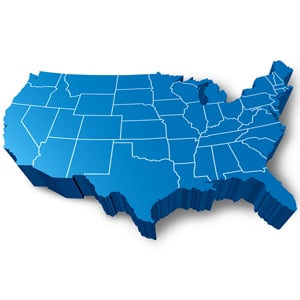Choice-of-law questions for state ethics rules examined in new ABA opinion

Image from Shutterstock.
Lawyers admitted to multiple jurisdictions may be subject to different ethical requirements in the different states in which they are licensed to practice law, according to a new ABA ethics opinion.
A March 1 ethics opinion from the ABA’s Standing Committee on Ethics and Professional Responsibility provides a comprehensive analysis of which jurisdiction generally controls in these instances.
The governing rule noted in Formal Opinion 504 is ABA Model Rule of Professional Conduct 8.5, which provides in subsection (a) that: “A lawyer admitted to practice in this jurisdiction is subject to the disciplinary authority of this jurisdiction, regardless of where the lawyer’s conduct occurs.”
A March 1 press release from the ABA is here.
Model Rule 8.5(b) deals with choice-of-law questions as follows:
1. “For conduct in connection with a matter pending before a tribunal, the rules of the jurisdiction in which the tribunal sits, unless the rules of the tribunal provide otherwise.”
2. For “any other conduct,” the “rules of the jurisdiction in which the lawyer’s conduct occurred or if the predominant effect of the conduct is in a different jurisdiction,” the rules of that jurisdiction shall be applied to the conduct. “A lawyer shall not be subject to discipline if the lawyer’s conduct conforms to the rules of a jurisdiction in which the lawyer reasonably believes the predominant effect of the lawyer’s conduct will occur.”
Thus, for litigation matters, a lawyer is subject to the rules of the jurisdiction of the court before which they are litigating a case. For other matters, the rule generally provides that the rules apply in which the lawyer’s conduct happened unless “the predominant effect of the conduct is in a different jurisdiction.” A difficult part of this rule determines when the predominant effect of the lawyer’s conduct is in a different jurisdiction.
In the opinion, the committee identified several factors as relevant to determining predominant effect:
• The client’s location, residence and/or principal place of business
• Where the transaction may happen
• Which jurisdiction’s substantive law applies to the transaction
• The location of the lawyer’s principal office
• Where the lawyer is admitted
• The location of the opposing party and other relevant third parties (residence and/or principal place of business)
• The jurisdiction with the greatest interest in the lawyer’s conduct
The rule does have a safe-harbor provision, providing that a lawyer will “not be subject to discipline if the lawyer’s conduct conforms to the rules of a jurisdiction in which the lawyer reasonably believes the predominant effect of the lawyer’s conduct will occur.”
The opinion then provided five scenarios of how Model Rule 8.5 applies to:
1. Fee agreements
2. Law firm ownership
3. Reporting professional misconduct
4. Confidentiality duties
5. Screening for laterals
For example, the opinion addressed a scenario in which a lawyer-client relationship is formed in State X, and the fee agreement is signed there. The client resides in State X, and the lawyer will work from their office in State X, but the litigation will happen in State Y, another state where the lawyer is licensed.
According to the opinion, while a lawyer is generally subject to the ethics rules of the jurisdiction when appearing before a tribunal, Comment 4 to Model Rule 8.5 explains that “conduct in anticipation of a proceeding not yet pending before a tribunal” is covered by Model Rule 8.5(b)(2), not Model Rule 8.5(b)(1).
In other words, drafting a fee agreement is conduct not yet pending before a tribunal, rather than litigation before a tribunal. This means that Model Rule 8.5(b)(2) would govern, and the question becomes where is the predominant effect of the lawyer’s conduct. The opinion noted that the lawyer and the client would reasonably regard that as State X, rather than State Y.
“The agreement is signed in State X, where [the] lawyer’s office is located, where [the] lawyer is admitted to practice, where [the] lawyer will research and prepare for the matter (even if done virtually), and where [the] client resides,” according to the opinion.
Thus, State X and its version of Model Rule 1.5, the rule regarding lawyer fees, would govern the fee agreement. The opinion cautioned that “to avoid ambiguity, a lawyer may want to identify in the fee agreement the lawyer’s belief as to which jurisdiction’s rules of professional conduct will apply to the fee agreement.”
The opinion provides similar detailed analysis of the other four scenarios.



